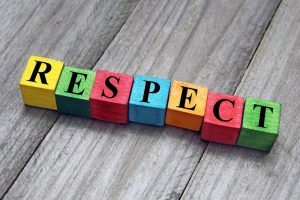R-E-S-P-E-C-T
Warren Lehr | March 2, 2020
Warren Lehr | March 2, 2020
 The word respect is so prevalent in our American culture that its meaning can get watered down. Respect has been both popularized and trivialized, respectively, by pop icons Aretha Franklin and Rodney Dangerfield. Who could possibly forget the late, great singer belting out R-E-S-P-E-C-T or the well-known stand-up comedian’s popular catchphrase, “I don’t get no respect!”?
The word respect is so prevalent in our American culture that its meaning can get watered down. Respect has been both popularized and trivialized, respectively, by pop icons Aretha Franklin and Rodney Dangerfield. Who could possibly forget the late, great singer belting out R-E-S-P-E-C-T or the well-known stand-up comedian’s popular catchphrase, “I don’t get no respect!”?
Respect is defined as “treating others with honor and dignity” and is the under-girding principle of peace and civility in real community.
There is a saying in the world of business management and leadership: “Culture eats strategy for breakfast.” In other words, how we truly live with our family, on our team, in our group or organization, and in our community is more important than what we say we believe, or what we intend or hope for, or what we print on a mission statement.
Unfortunately, you don’t have to look very far in America today to see the absence of respect. People everywhere read, watch, and share only news that confirms what they already believe. Thomas Sowell, a social theorist and Stanford professor recently said, “One of the most pathetic – and dangerous – signs of our times is the growing number of individuals and groups who believe that no one can possibly disagree with them for any honest reason.” However, as we all know, people do disagree for heartfelt and legitimate reasons. We have to try to respect and understand others for any hope of compromise and peace. A culture of respect requires compromise and agreement sometimes, but understanding always. In that regard, understanding and respect are more important than agreement. But instead, we regularly see disagreement and division inflamed by assumptions of intent and assignments of motive coupled with jumps to conclusions and rash judgments about the value of others’ views and beliefs.
Unity and civility can only be maintained with loyalty to one another that has as its foundation respect and belief in the equal value of all people. The prominent American Psychiatrist, Karl Menninger said, “Loyalty means not that I am you, or that I agree with everything you say or that I believe you are always right. Loyalty means that I share a common ideal with you and that regardless of minor differences we fight for it, shoulder to shoulder, confident in one another’s good faith, trust, constancy, and affection.” To borrow from Menninger – Respect means not that I am you, or that I agree with everything you say or that I believe you are always right, but regardless of our differences, we are confident in one another’s good faith, trust, and respect.
Like few times in our history, Americans everywhere seem to think they’re better than those who look different, think differently, or believe differently than they do. And because we have such a high opinion of ourselves and such a low opinion of others, we easily justify disrespect, bad behavior, and increasingly, even violence toward those with whom we differ. In our incredibly polarized culture today, simple acts of respect toward others set us apart and make us different, even counter-culture, if you will.
November marks the beginning of a season of gratefulness in America. John F. Kennedy said, “As we express our gratitude, we must never forget that the highest appreciation is not to utter words, but to live by them.” So, it is right to be grateful in this season of thanksgiving, but it is our duty to express and act out our appreciation through our service to and respect for others.
To summarize very simply, as long as respect for others is held as a non-negotiable standard, Owasso will continue to flourish and thrive as a community where people are grateful to live.
Originally published in the Owasso Reporter

 Providing encouragement so that others can continue to move forward
Providing encouragement so that others can continue to move forward